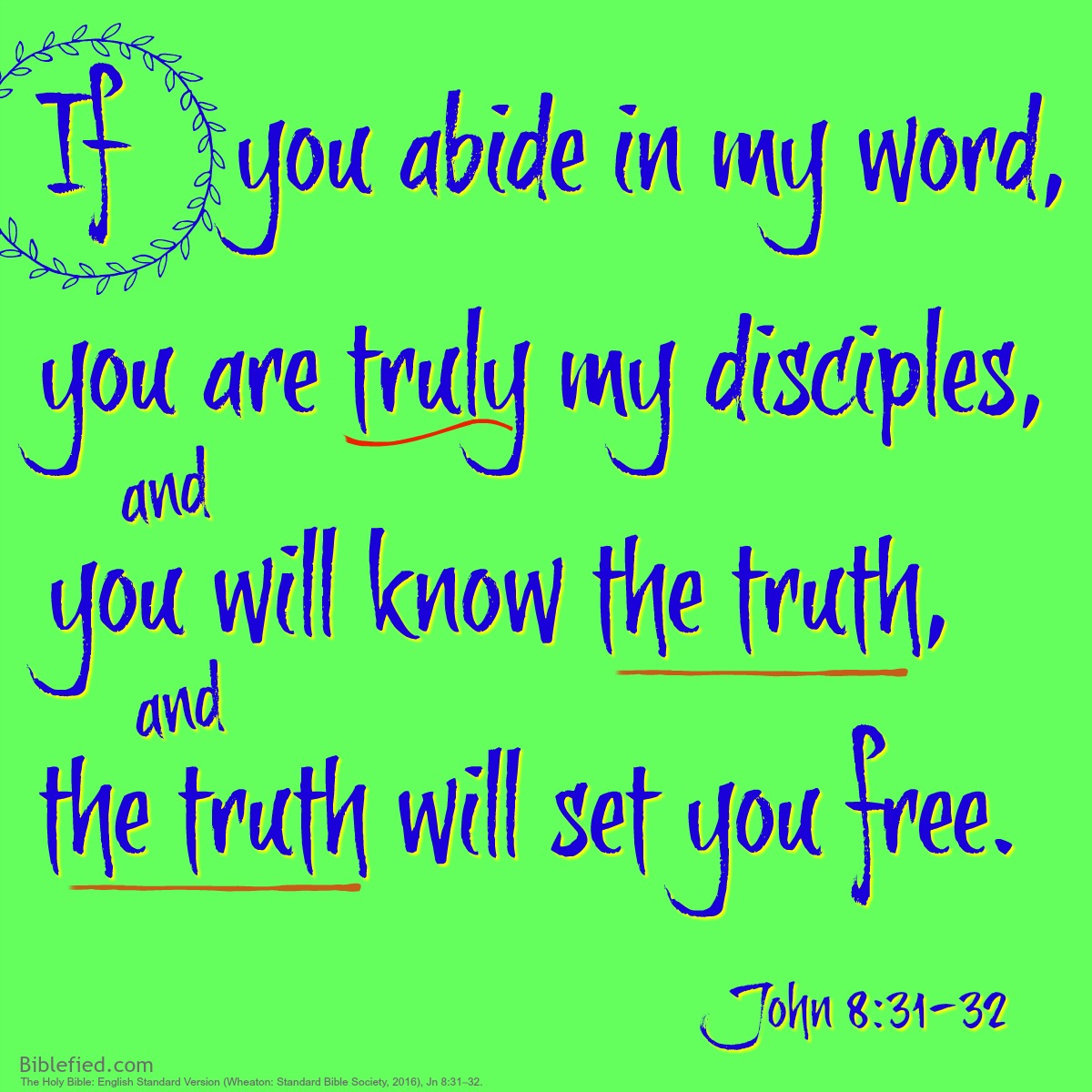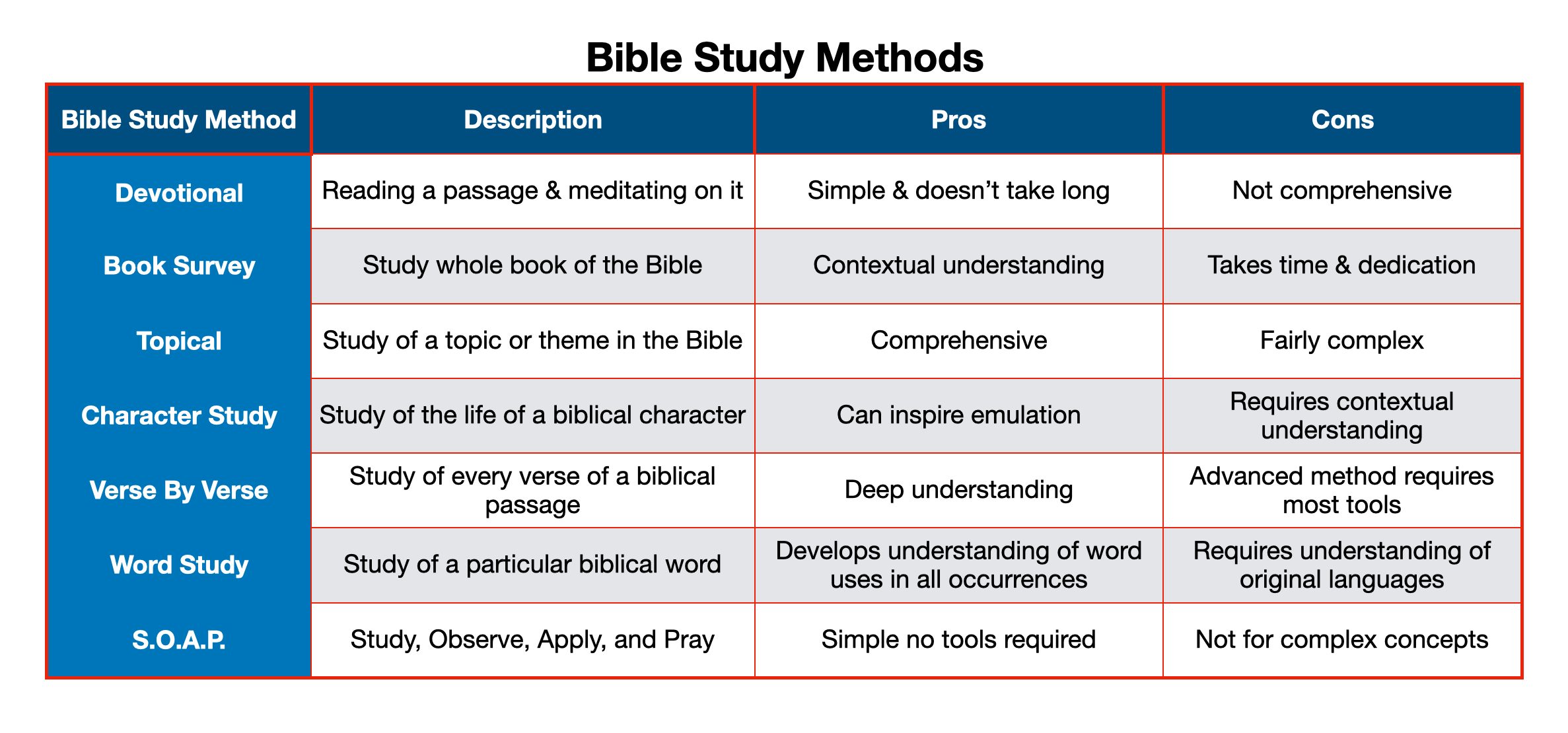|
|
How to Study Your Bible
If you want to deepen your grasp of the Bible, it's important to understand how to study your Bible using the various methods available to you. This page gives you an overview of seven different approaches with pros and cons of each.
We believe that helping you understand these different Bible study techniques is key to making an informed decision about the best approach for you to study the Bible.
How to Study Your Bible - The Devotional Method

The Devotional method is a pretty straightforward process. It involves reading a particular portion of the scripture and meditating on it. We encourage you to begin your day with Bible study. This is critical in this method because you devote yourself to Bible study to start your day. The goal is to seek personal application and relevance to life, taking to heart the life-changing words from the scriptures you study.
The upside of the Devotional method is its simplicity. It doesn't require much time, or any special scholarly abilities. It encourages a personal connection with God, fostering a more intimate relationship. However, this method is that it may not always encourage comprehensive understanding of complex theological concepts found in the Bible. Also, some might be tempted to “just check it off” and move on.
Studying the Bible is one of the best things you possibly can do with your time. Perhaps the only thing you can do that's better is to spend your time applying what you've learned.
Resources:
- Morning and Evening, by Charles Spurgeon
- My Utmost for His Highest, by Oswald Chambers
How to Study Your Bible - The Book Survey Method

This a more comprehensive approach which focuses on a whole book of the Bible rather than a single verse or chapter as you would in the devotional method. It will likely lead to you a more general understanding of the Bible.
Also, this method allows for better contextual understanding. This is because you develop views based on the teachings of an entire book. You can also develop a deeper understanding of a particular writer’s style or perspective if you survey several books he’s written. However, it this method takes time and requires a higher dedication level. For example, the Book of Genesis is fifty chapters long!
Resources:
- The Old Testament Survey: The Message, Form, and Background of the Old Testament, by William Sanford Lasor, David Allen Hubbard, and Frederic William Bush
- An Introduction to the New Testament, by D.A. Carson and Douglas J. Moo.
How to Study Your Bible - The Topical Method

This method focuses on studying different topics or themes in the Bible. You simply pick a subject; for instance, faith or love, and trace what the Bible says about that topic throughout its entirety. Also, you could choose to limit your focus to only the New or Old Testament.
The chief advantage here is you gain a comprehensive view of specific themes or biblical truths. It can, however, prove fairly complex as it requires a lot of cross-referencing and the ability to synthesize vast amounts of information.
Resources:
- Central Themes in Biblical Theology, Edited by Scott J. Hafemann and Paul R. House
- Collins Thesaurus of the Bible, by A. Colin Day
- Dictionary of Bible Themes by Martin Manser
- The New Naves Topical Bible, by James Swanson
- The New Topical Text Book, by R.A. Torrey
- Topical Analysis of the Bible, Edited by Walter A. Elwell
- Willmington’s Book of Bible Lists, by H.L. Willmington
How to Study Your Bible - The Bible Character Study Method
This method focuses on studying the lives and/or teachings of the different characters in the Bible. It can be a great source of inspiration to you as you study. You can gain deep insights into how the characters lived out their faith in the context of their stories.
By studying Bible characters, you get a clear guidance of biblical principles manifest in living examples. Be careful though. We often tend to idolize characters, forgetting that they too, were human and imperfect. Also, without a comprehensive understanding of the culture and customs of the time, misinterpretations can occur.
For example, we offer David. Yes, he was a truly great man of God but like all men was a sinner (see 2 Samuel 11). Our only idol is the sinless one - Jesus Christ. It’s him we should study first as he was without sin and is our only worthy idol.
Resources: Although some books of the Bible bear the names of biblical characters they’re written about someone else (e.g. the Gospels).
However, many books can offer a you a study of someone’s life. For example: Daniel in the Book of Daniel, Ruth in the Book of Ruth, Esther in the Book of Esther.
Other books don’t bear the name of characters but you can study Biblical characters such as Joseph, David, Paul, and Hannah.
How to Study Your Bible - The Verse-by-Verse Method
This method is suitable for people seeking an exhaustive understanding of the scriptures. Here, you break down every verse in a chapter or a book for critical study. It helps you gain an understanding of each scripture in its immediate and larger biblical contexts. If you want to go deep, we recommend a verse-by-verse approach.
The exhaustive nature of this method is its primary advantage. However, it can be quite laborious, time consuming and might require more advanced biblical knowledge and tools such as concordances and commentaries. Its best to partner with a family member or friend for this type of study unless you have some advanced training.
Resources:
- Strong’s Exhaustive Concordance, by James Strong
- New American Standard Exhaustive Concordance of the Bible, Edited by Robert L. Thomas
- Commentaries as recommended by bestcommentaries.com
How to Study Your Bible - The Word Study Method
This method involves studying a particular word found in the Bible. You choose a word to study its meanings based on its usage. You also would note where it occurs in the Bible. Because the Bible was originally written in Hebrew and Greek, you would study the occurrence of the word in either the Old Testament (Hebrew) or New Testament (Greek).
With this method you can deepen your understanding of specific biblical words and their implications. But be careful here because you will need to rely heavily on a correct understanding of the ancient languages, which can be challenging. Therefore, you may need special training or tools to assist you. We offer some suggestions for you here.
Resources:
- A Handbook to Biblical Hebrew: An Introductory Grammar, by Page H. Kelley, Terry L. Burden, and Timothy G. Crawford
- Introduction to Hebrew: A Guide for Learning and Using Biblical Hebrew, by William Fullilove
- Invitation to Biblical Hebrew: A Beginning Grammar Workbook, by Russell T. Fuller and Kyoungwon Choi
- Reading Koine Greek: An Introduction and Integrated Workbook, by Rodney J. Deker
- An Introduction to New Testament Greek: A Quick Course in Reading Koine Greek, by Frank J. Beetham
- Pocket Dictionary for the Study of New Testament Greek, by Matthew S. DeMoss
How to Study Your Bible - The S.O.A.P. Method
This clean method (pardon the intentional pun) can be effective for your personal spiritual growth. The name for this method is an acronym that stands for Scripture, Observation, Application, and Prayer. However, it won’t be your be best choice if you’re trying wish to understand complex biblical concepts.
Anyway, it’s a good method and perhaps you should try it yourself to see how it works for you. The Good news here is that anyone can do this by just following these simple steps:
First, read a passage of scripture (Scripture). Next, observe the passage to understand what God is teaching you in the passage (Observation).
Now, what that you just learned can you apply to your life (Application)?
Finally, pray and ask God to reveal to you if there is anything you’ve learned about his passage as it relates to your life. Perhaps there is a sin to confess, a command to obey or a blessing to be thankful for (Prayer).

Conclusion
Choose the Bible study method that works best for you. You may need to try several before you discover your best method because there’s no one-size-fits-all. Each method has its strengths to offer and limitations to be aware of.
You’ll know when you choose how the study the Bible that works best for you. If you’re unsure, ask God to show you the way. He wants you to understanding of His Word because He wants you to apply to your life.
As you undertake this journey, we offer you an e-book that explores the eight different Bible study methods mentioned above. Get the e-book for yourself or as your gift to someone you love.
Discover Your Bible Study Method: Click Here (in development 9-25-23)